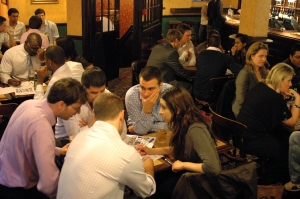Getting people back to the office through the medium of quiz!
How can QuizQuizQuiz help you to attract people back to the office?
As companies navigate the return to in-office work, the challenge is not only bringing employees back to the workplace but also ensuring that they are engaged, motivated, and excited about being there. If you’re looking for a way to boost morale and foster collaboration, consider booking QuizQuizQuiz, a professional quiz company renowned for its expertise in creating unforgettable quiz events. Here’s why QuizQuizQuiz is the perfect choice to run an event that encourages people to return to the office.
1. 20 Years’ Experience:
QuizQuizQuiz has been immersed in all things quiz for two decades. With a track record of success and many thousands of quizzes under their collective belts, our experienced team understands how to create engaging and entertaining experiences tailored to your specific needs.
2. Quiz tailored to suit the event and the audience:
Tailoring the quiz to align with your company’s culture, the aims of the event and the people taking part is crucial. We make the quiz inclusive, entertaining and interactive. This means teams have a great time at the event.
3. Expert Hosts:
The success of a quiz event often hinges on the skill of the hosts. QuizQuizQuiz boasts a team of expert quizmasters who are not only knowledgeable but also adept at creating a lively and inclusive atmosphere. Our hosts ensure that the event is fair, fun and fact-filled! We are skilled at matching your company culture and the pace and mood that would best suit the teams.
4. Focus on Team Building and Collaboration:
Quiz events are not just about answering questions; they’re powerful tools for team building. We design quizzes to encourage collaboration, communication, and friendly competition, fostering stronger connections among team members.
5. Flexibility in Event Formats:
QuizQuizQuiz understands that one size does not fit all. We offer a range of event formats, from traditional pub-style quizzes to interactive multimedia experiences. This flexibility ensures that the event aligns seamlessly with your company’s goals and preferences.
7. Effortless Event Planning and Execution:
Planning an event can be a daunting task, but QuizQuizQuiz takes the stress out of the process. From initial consultation to flawless execution, our team handles all aspects of quiz planning, right down to the pens and paper.
8. Enhanced Office Morale and Employee Engagement:
By choosing QuizQuizQuiz, you’re not just organizing a quiz; you’re investing in a morale-boosting experience that employees will remember. An engaging quiz event can instill a sense of excitement, making employees more enthusiastic about being back in the office.
QuizQuizQuiz stands out as the go-to choice for companies seeking to revitalize their office environment through engaging and entertaining quiz events. By booking our services, you’re not only investing in a memorable experience but also creating a positive atmosphere that encourages people to return to the office. Transform your workplace into a hub of excitement with QuizQuizQuiz, where professional excellence meets unparalleled entertainment.
Contact us to find out more – we’re always happy to put you in touch with other clients who have held similar events to yours so that you can hear about the fun they had. We also have our free, weekly Friday and Wednesday email quizzes, which we know are read out as a mini quiz in offices all over the UK and beyond!

